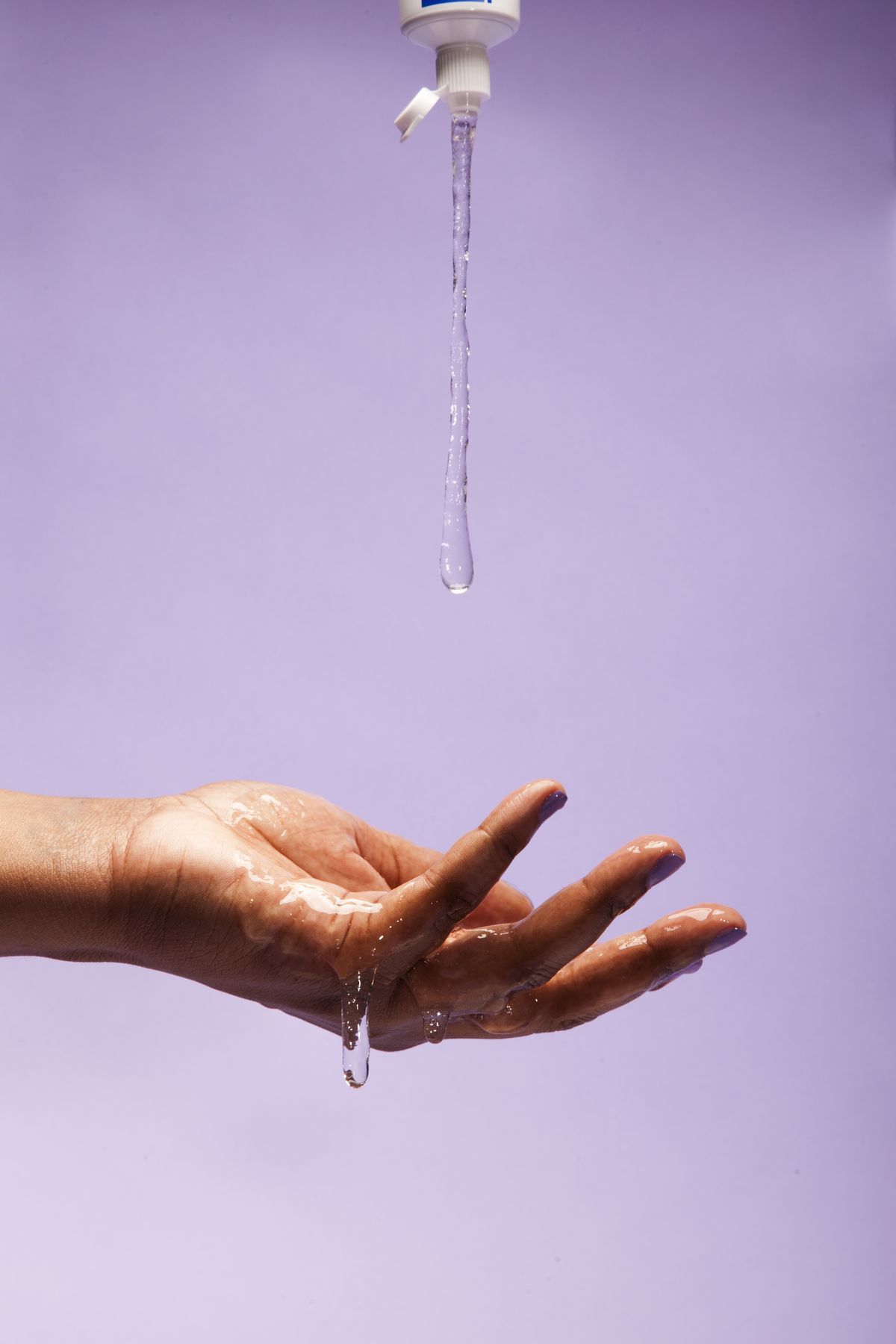Find out how to choose—and use—your personal lubricant for mind-blowing sex.
FACT: YOU CAN never have too much lube during sex. But for some reason, there’s long been a stigma around using lube—the major misconception being that it somehow means you failed to turn your partner on. There’s no shame in the lube game—in fact, experts say everyone should have some at the ready in their bedside drawer. Still skeptical? One 2022 review found that women reported less pain and greater sexual well-being when they used lube.
“The reality is that women don’t always get soaking wet when they’re turned on,” explains Jess O’Reilly, resident sex expert for ASTROGLIDE. “A range of factors can affect vaginal lubrication including diet, hydration, medication, the menstrual cycle, menopause, overall health, and stress. Sometimes a woman randomly gets wet while they’re doing the dishes and sometimes they don’t get wet when they’re highly aroused.”
Whatever anatomy you and your partner(s) have, there are lots of reasons why you might want to try lube, says Suzannah Weiss, a certified sex educator and resident sexologist for Frolicme. Vaginal dryness—which can happen during particularly long sex sessions, or due to hormonal changes—can make intercourse pretty uncomfortable, and lube can prevent that. Lube is also a must-have for avoiding discomfort and injury during anal play, says clinical sexologist and certified sex counselor Dr. Lori Davis. Even when you’re not enjoying partnered sex, you can seriously level up your masturbation by busting out the lube.
If you’re considering introducing lube into your bedroom, congrats—you’re in for a world of fun. But you may also have some questions. Like, how exactly does lube work? When should you use it? And WTF is the difference between water- and silicone-based lube?
Fret not, though: we’ll answer all your burning questions. Below, experts share everything you need to know about choosing—and using—lube.
If you’re considering introducing lube into your bedroom, congrats—you’re in for a world of fun. But you may also have some questions. Like, how exactly does lube work? When should you use it? And WTF is the difference between water- and silicone-based lube?
Fret not, though: we’ll answer all your burning questions. Below, experts share everything you need to know about choosing—and using—lube.
How does lube work?
Personal lubricant, also known as lube, is a gel or liquid that you can apply to your or your partner’s penis, vagina, anus, or even fingers during sex. Fun fact: KY Jelly may have been the first commercial lubricant launched in 1919, but as early as 350 B.C., people used olive oil for the same purposes.
Sex involves a lot of friction—and without adequate moisture, that friction can cause discomfort. But that’s where lube comes in: certified sex therapist Aliyah Moore, notes that these products provide a slippery buffer between your and your partner’s skin. This allows for smoother gliding—which then translates to a more enjoyable experience.
What are the benefits of using lube?
The main purpose of lube is to make sex more pleasurable—or at the very least, more comfortable.
Here are just some of the other perks, according to sex and intimacy coach Yael Rosenstock Gonzalez:
• Ensures safer sex: By reducing friction, lube helps to prevent a condom from breaking—thereby reducing your risk of unintentional pregnancy or sexually transmitted infections.
• Prevents injuries: Less friction during penetrative sex means lower chances of vaginal and anal soreness, tearing, and abrasions.
• Allows for more spontaneity: Lube can come in handy when you don’t have enough time for foreplay.
• Enhances the experience: Some lubricants contain warming or cooling agents, which bring new sensations to your sexual experiences.
Which type of lube is right for me?
There are a variety of different types of lube, and each has its own pros and cons. Ultimately, the best lube for you depends on your skin type, personal preferences, and the sexual situations you’re using it for.
With that in mind, here’s what to know about each.
Water-based
Water-based lubricants are the most popular, O’Reilly says, and for good reason: They’re easy to clean up, don’t leave stains, and can be used with most sex toys and condoms.
These products tend to contain mostly natural ingredients and contain fewer potential irritants, making them ideal for people with sensitive skin. That said, the one downside to water-based lube is that it tends to dry up more quickly, according to Moore. That means you may have to reapply more frequently.
Also, Gonzalez notes that this type of lube tends to wash away too easily in water—so, needless to say, it’s not ideal for shower sex.
Silicone-based
Silicone-based lubes boast a luxuriously silky and slippery feel—and they’re hypoallergenic, O’Reilly says. Since they’re long-lasting, you won’t have to worry about reapplying during marathon romps.
Unlike water-based lubes, these products are waterproof—so feel free to use them when you’re fooling around in the shower or tub.
However, Moore notes that silicone-based lubricants shouldn’t be used with some cheaper sex toys made of silicone, as they can cause the material to deteriorate over time.
Oil-based
These products are typically made from natural plant-based oils, such as coconut oil, almond oil, or sunflower seed oil. While they’re long-lasting, there also have some downsides.
For one, Moore and O’Reilly note that oil-based lube can break down latex, making condoms more prone to tearing.
Another thing to consider? Oil-based lubes may stain your sheets and may be a little harder to clean off your skin or sex toys than water- and silicone-based products.
Ultimately, it may be safer to use oil-based lube for outercourse rather than intercourse—because according to sex therapist Leigh Norén, some oils can promote yeast infections by disrupting the vagina’s microbiome.
Hybrid
These lubricants feature a base that combines water and silicone. They're long-lasting as well as non-staining, but there are also a few cons to this type.
“They provide the best of both worlds, with the slipperiness of silicone-based lubricants and the easy cleanup of water-based lubricants,” says Moore.
However, Gonzalez advises reading the label on a hybrid lube carefully—some may be suitable for silicone toys and some may not, depending on the amount of silicone present in the product.
Are there safety considerations?
Particularly if you have sensitive skin, Moore says it’s important to look for lubes that don’t contain:
• Parabens
• Fragrances
• Dyes
In the interest of looking out for the lady in your life, Moore notes that lubes with glycerin or sugars can also disrupt the vagina’s microbiome and increase the likelihood of yeast infections. If your partner is prone to yeast infections, she advises seeking out products that are pH-balanced.
When trying a new lube, O’Reilly suggests first doing a patch test by applying a small amount on the inside of your and your partner’s thigh. This way, you can see how your skin reacts before rubbing it all over your sensitive bits.
Another thing to keep in mind? If you’re trying to get pregnant, studies have shown that some lubricants may reduce sperm motility. So, if you and your partner are trying to get pregnant, look for a sperm-friendly lube.
Astroglide is available at every Woolworths Supermarket across Australia.
Astroglide is available at Chemist Warehouse online


